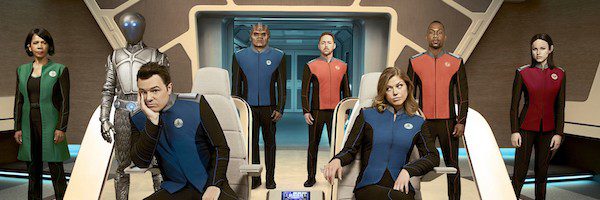
So I’ve been watching The Orville lately.
Actually, that’s not entirely correct. I have watched three episodes, on demand, while using the exercise bike in the morning, after I got bored with This Is Us. It’s a curious mix of a show, trying to be serious and yet add in humor at the same time, with lots of references to current day popular culture that you have to just take with some suspension of disbelief, and consider these references as placeholders for whatever the 24th century equivalents would be. (Actually, suspension of disbelief is pretty key to watching the whole show.) And, so far at least, it’s episodic, so that you don’t have to pay attention in the same way as with a serial-type show.
But I continue to ask myself the question, is The Orville trying to take itself seriously, or just entertain its audience?
In the third episode, Bortus, a member of the all-male Moclan species, and his mate, Klyden, have just had a baby (they lay and hatch eggs). Because the baby is unexpectedly a female, they ask the ship’s doctor to perform a sex change operation, and when she refuses, they go to their home planet. In the meantime, by means of watching Rudolph the Red-Nosed Reindeer, the goofball pilots convince Bortus not to go through with it, but Klyden insists, and reveals he was born a girl and knows that the baby would be mocked and ostracized if she remains a female. There is a Moclan tribunal at which, despite a last-minute visit from a Moclan female who was not converted and has lived as a hermit and proclaims “I am happy to be a female,” the determination is made that Klyden’s decision is correct, the baby receives the operation, and they return to the ship.
Vox presumes that this episode is a pitch in favor of transgender rights, and proceeds to insist that they’ve done a terrible job at it.
If this episode had come out 10 years ago, it might have looked a bit more progressive. But in 2017, as thinking on gender continues to evolve, the episode comes off for what it is: a repetition of flat talking points that are too basic even for the “transgender” Wikipedia entry (which, as I’ve now realized, is obviously flawed but surprisingly thorough!). Hell, it’s not even clear if MacFarlane is trying to have a conversation about what it means to be trans versus what it means to be intersex — which are, of course, two completely different things. That’s how haphazard his terminology is throughout this episode.
It doesn’t seem that way to me.
You could read the episode as anti-male. The planet, composed of only men, is polluted. Their economy is based on weapons manufacture and sale to other planets, and they test those weapons without regard for safety. Their recreation is a visit to a shooting range. They view females as disabled because they are weaker, and, since they aren’t needed for reproduction, they medically convert them into males at birth. (We are told early on that a female birth is a rare event, but within the confines of the story, perhaps the viewer is meant to conclude that it’s more common and just a matter of female births being hidden.) A male-only world is a terrible place — except that they love literature, and the male couple is loving and even when Bortus opposes the decision that his mate makes, he stands by his commitment: “he is my mate.”
You could read it as pro-gay, in its call for acceptance of undesirable babies just as they are, without changing them. Or maybe pro-intersex-babies, though that gets a bit obscure. There’s a pro-life element to it, though, of course, they weren’t trying to kill babies they thought were deformed, as our society does with Down syndrome babies, just “fix” them.
Star Trek, by comparison, had an episode in which the Enterprise was at a plant of “nongendered” people, but one of them, who “felt” female inside, fell in love with Riker; her secret feeling of femaleness being discovered, she was administered a treatment that made her conform and took away those feelings. That was clearly a ham-handed pro-gay rights script. But, on the other hand, in Deep Space Nine, the character of Julian Bashir was revealed to have been genetically enhanced, because his parents were ashamed when he was developmentally delayed, and that was portrayed in a more complex manner.
But just because the operation in question was to change the baby’s sex from male to female, does not seem to warrant the literalist reading that this is about transgender people. After all, transgender rights are based on the notion that it’s good and proper, not objectionable, to surgically change people’s bodies and infuse them with hormones. (Unless we’re meant to cheer Klyden and object to the crew’s attempt to prevent the operation?)
Either the writers intended for it to be a transgender-rights pitch and screwed up, or the writers actually intended to say, “it’s complicated.” Or maybe they didn’t have any grand intention at all except to tell what they thought was an interesting story, and let the viewers interpret it how they wished. Perhaps if I dug a little further I’d find some quote from the producers of the show saying, “this episode will demonstrate to everyone that we thirst for Social Justice for all marginalized peoples so you should watch our show,” but I’ll refrain from doing so, because I really hope that’s not the case, and I’d really prefer they stick to trying to tell engaging stories.
Image: from http://collider.com/the-orville-new-trailer/#images; fair use/commentary













